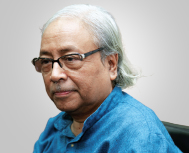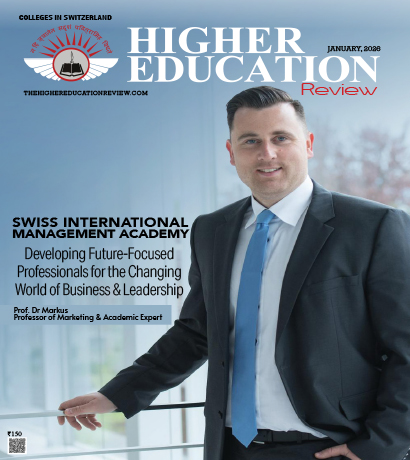SIES College of Management Studies: For a Generation of Coherent Business Leaders

A.K. Sen Gupta, Mentor SIES College of Management Studies
The world of higher education has entered into a period of drastic changes. Many classrooms have been flipped, MOOCs have become an integral part of the education system and competency based learning is becoming mainstream. Today, non-traditional students are the new tradition. To sustain in this dynamic environment, educational institutions need to migrate from conventional ways of teaching. It is exactly that which SIES College of Management Studies, a 22-year-old B-School from Navi Mumbai, has been attempting to do. An institute with a difference and known as one of the innovative business schools in the country, SIESCOMS is always into something new and creative, either in product or in process. "We have been doing so and the result has been obvious " SIESCOMS has always been the top of mind to recall for both students and corporate, as a cherished business school and an institute that creates Indian managers-leaders with a global outlook," says A.K. Sengupta, Mentor of SIESCOMS.
To develop specific research orientation among the first year PGDM students, the institute has come out with a unique concept known as Idea Research
One such strategy that has always differentiated SIESCOMS from other B-schools is the Leadership Trait Development Program (LTDP), which is aimed at developing leadership qualities through a structured intervention. The objective of the program is to develop leaders, not mere managers, who can take control of and lead business organizations in turbulent times. "The six leadership traits identified for this purpose are character and integrity, charisma, influencing ability, ability to think differently with a long-term perspective, entrepreneurship, and ability to administer ideas into reality. Specific leadership interactions are also organized to understand the six traits and to develop them," claims Sengupta. To develop these leadership traits, the institute conducts various activities that include experiential sharing exercises, outbound activities, leadership summits, seminars, working with non-governmental organizations and so on.
"Though all subjects are usually taught in two components, namely, knowledge and application, there is lack of a holistic approach in learning. To tackle this problem, we have come out with an initiative called Skill Linked Immersion Project (SLIP), which is mandatory for all the students, as it will help them to develop a particular skill," opines Sengupta. SLIP-I is focused on generic skills that are needed for any manager irrespective of specialization. These include understanding self, leadership skills, teamwork, sustaining motivation, stress management and effective time management. Certain competency levels are drawn for measuring all these parameters. "This is an intensive three-day exercise and during this period there are no classes and only activities are conducted under guidance of faculty and external experts. At the end, the students will become about their areas of improvement," adds Sengupta.
The institute has gone a step ahead by introducing SLIP-II. "It is more focused on specific skills, which are both functional and domain specific," says Sengupta. Be it for a student who wants to inculcate specific skills needed for recruitment in BFSI sector or a student who intends developing skills of equity research in the telecom sector, SLIP-II will help them to achieve the skills required for it. "This activity is conducted intensively through coaching / guiding / exposing them to the outside expert, corporate for a period of three days. Being a graded course, students are expected to submit a brief project report about the skills that they have developed at the end of the program," adds Sengupta. The combined effect of SLIP- I & II is a new breed of confident individuals who are well-equipped with the required skills for a successful manager.
Sengupta also believes that there is a positive relationship between innovation and research in the management education domain. He states, "Understanding the problem, defining the problem and approaching with a scientific mindset are crucial for future business leaders." To develop specific research orientation among the first year PGDM students, the institute has come out with a unique concept known as Idea Research. Idea Research helps to foster out-of-the-box thinking besides enabling students to learn the scientific methods of research. Students form teams and take a problem, social or otherwise, then analyze the same with proper methodology. Since this is done at the beginning of the first year, the institute has kept the methodology simple by applying both primary and secondary research techniques. The best publications are brought out in an annual compendium known as Idea Research Compendium that has become quite popular among corporate and others.
With plans to include many more innovative methodologies, SIESCOMS aims to touch the lives of each student and make it different through a very strong value system, which flows right from the top management till the front end office bearers.
A.K. Sen Gupta, Mentor
Dr. A.K. Sen Gupta, currently serving as Mentor at SIESCOMS has vast experience in the field of education. He is also the founder and convener of Higher Education Forum (HEF), the largest on-line community of persons interested in higher education in India.
To develop specific research orientation among the first year PGDM students, the institute has come out with a unique concept known as Idea Research
One such strategy that has always differentiated SIESCOMS from other B-schools is the Leadership Trait Development Program (LTDP), which is aimed at developing leadership qualities through a structured intervention. The objective of the program is to develop leaders, not mere managers, who can take control of and lead business organizations in turbulent times. "The six leadership traits identified for this purpose are character and integrity, charisma, influencing ability, ability to think differently with a long-term perspective, entrepreneurship, and ability to administer ideas into reality. Specific leadership interactions are also organized to understand the six traits and to develop them," claims Sengupta. To develop these leadership traits, the institute conducts various activities that include experiential sharing exercises, outbound activities, leadership summits, seminars, working with non-governmental organizations and so on.
"Though all subjects are usually taught in two components, namely, knowledge and application, there is lack of a holistic approach in learning. To tackle this problem, we have come out with an initiative called Skill Linked Immersion Project (SLIP), which is mandatory for all the students, as it will help them to develop a particular skill," opines Sengupta. SLIP-I is focused on generic skills that are needed for any manager irrespective of specialization. These include understanding self, leadership skills, teamwork, sustaining motivation, stress management and effective time management. Certain competency levels are drawn for measuring all these parameters. "This is an intensive three-day exercise and during this period there are no classes and only activities are conducted under guidance of faculty and external experts. At the end, the students will become about their areas of improvement," adds Sengupta.
The institute has gone a step ahead by introducing SLIP-II. "It is more focused on specific skills, which are both functional and domain specific," says Sengupta. Be it for a student who wants to inculcate specific skills needed for recruitment in BFSI sector or a student who intends developing skills of equity research in the telecom sector, SLIP-II will help them to achieve the skills required for it. "This activity is conducted intensively through coaching / guiding / exposing them to the outside expert, corporate for a period of three days. Being a graded course, students are expected to submit a brief project report about the skills that they have developed at the end of the program," adds Sengupta. The combined effect of SLIP- I & II is a new breed of confident individuals who are well-equipped with the required skills for a successful manager.
Sengupta also believes that there is a positive relationship between innovation and research in the management education domain. He states, "Understanding the problem, defining the problem and approaching with a scientific mindset are crucial for future business leaders." To develop specific research orientation among the first year PGDM students, the institute has come out with a unique concept known as Idea Research. Idea Research helps to foster out-of-the-box thinking besides enabling students to learn the scientific methods of research. Students form teams and take a problem, social or otherwise, then analyze the same with proper methodology. Since this is done at the beginning of the first year, the institute has kept the methodology simple by applying both primary and secondary research techniques. The best publications are brought out in an annual compendium known as Idea Research Compendium that has become quite popular among corporate and others.
With plans to include many more innovative methodologies, SIESCOMS aims to touch the lives of each student and make it different through a very strong value system, which flows right from the top management till the front end office bearers.
A.K. Sen Gupta, Mentor
Dr. A.K. Sen Gupta, currently serving as Mentor at SIESCOMS has vast experience in the field of education. He is also the founder and convener of Higher Education Forum (HEF), the largest on-line community of persons interested in higher education in India.

